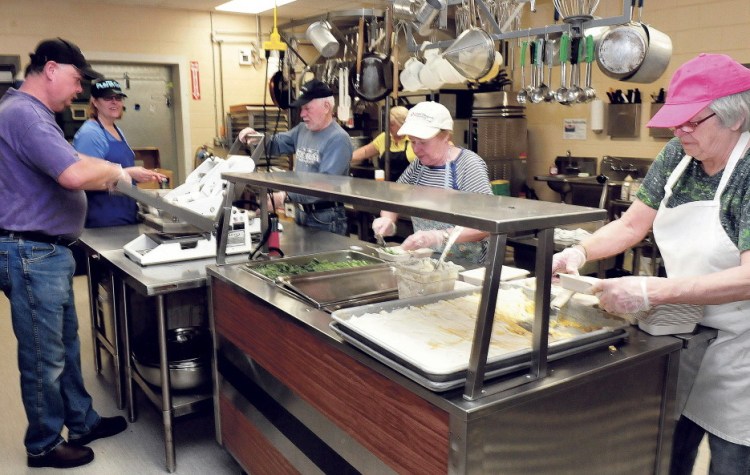AUGUSTA — On Wednesday, central Maine’s Meals on Wheels provider had to turn away five homebound seniors.
They’re now among 14 people on a waiting list at Spectrum Generations, the agency on aging in central Maine that recently learned it lost $39,000 in federal funding between now and September. The agency says it now can’t add new seniors to its program, which delivers free or low-cost hot and frozen meals to low-income seniors who are often homebound.
Maine’s five agencies on aging got approximately $130,000 less than last year in an initial allocation from the federal government under the Nutrition Services Incentive Program, forcing some to institute wait lists and to deliver thousands fewer meals across the state. That money is a small chunk of their budgets – 4 percent at Spectrum over six months – and should be restored by September.
But there may still be gaps in service before then for Spectrum, which serves meals for a suggested $5 donation, but doesn’t turn down people based on ability to pay. If the full cut stood, the agency serving Kennebec, Somerset, Lincoln, Knox, Sagahadoc and Waldo counties expects to serve 6,200 less meals between now and September, which they said could put some seniors’ health at risk.
“They rely on the friendly volunteer to knock on their door,” said Debra Silva, a Spectrum spokeswoman. “People rely on the hot meals that they get, plus the frozen meals. It’s a safety check. It’s a social check.”
Maine’s Meals on Wheels programs were cut in March 2013, when federal agencies had to cut $85 billion in spending. Cuts to the program have an outsized impact in the state, which has the largest share of baby boomers in the nation. More than 18,000 people turn 65 each year here, according to a 2013 Portland Press Herald series on aging. This isn’t the same scenario as the 2013 cuts.
Ann Mosher, a spokeswoman for the federal Administration for Community Living, said Maine’s initial allocation of $474,000 only represents 75 percent of program money. The remaining 25 percent will likely be distributed in August, once meal counts from the prior year are finalized. All states are affected. Overall, the agency has distributed $117 million to U.S. states and territories under the nutrition program. They got $150 million by the 2014 fiscal year’s end in September, when Maine got $600,000, making up part of agencies’ funding.
Noelle Merrill, executive director of the Eastern Area Agency on Aging, is optimistic. If her agency, which covers Penobscot, Piscataquis, Hancock and Washington counties, lost its $20,000 share of funding, it wouldn’t be able to serve 4,250 meals by September, but she said she has “been here long enough” to know that cuts this time of year may not be final.
Spectrum CEO Gerry Queally, however, disagreed.
“I don’t know how you run your checkbook,” he said, “but we can’t run our finances based on a promise from the federal government that may not come true.”
Ted Trainer, who runs the Meals on Wheels program in Cumberland and York counties, said the Southern Maine Agency on Aging would lose $47,000, about 3 percent of its annual budget, if a cut stood. He said it’s considering putting seniors on a wait list for the first time in the agency’s history.
After past cuts, he said the agency has cut staff and even cut the before-meal bread and butter and desserts from their packages, so there’s little room to cut without trimming the number of people served.
And SeniorsPlus, an agency serving Androscoggin, Franklin and Oxford counties, is having an inaugural fundraising event for its Meal on Wheels program on Friday at an Auburn hotel. Betsy Sawyer-Manter, the executive director, said 3,400 less meals will be served after her agency’s cut of $18,000. There’s already a waiting list with 100 people on it.
“It’s coming at a time when we’ve already had people waiting for meals,” Sawyer-Manter said. “Unfortunately, it’s been compounded.”
Send questions/comments to the editors.



